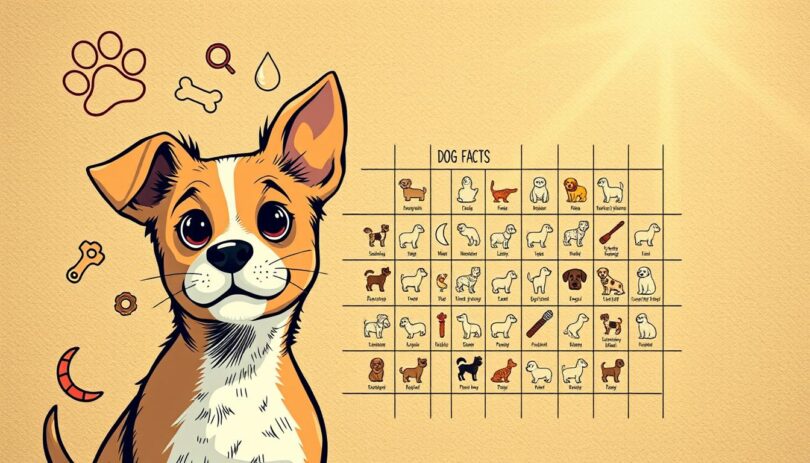Dogs have been by our side for thousands of years, and yet they still surprise us every day. As the first animal domesticated by humans over 20,000 years ago, dogs have evolved from wolves into the diverse, loving companions we know today. Their journey from wild predators to household pets is a testament to their adaptability and the unique bond they share with humans.
Did you know that dogs have some extraordinary abilities? Bloodhounds, for instance, have a sense of smell so precise that their testimony is accepted in court. Their noses are equipped with up to 300 million scent receptors, making them invaluable in search and rescue missions. This incredible sense of smell is just one of the many fascinating traits that set dogs apart.
Just like humans, dogs have dominant paws, and they communicate largely through body language. Their ability to understand and respond to human emotions makes them not just pets, but true friends. Whether they’re guiding the blind, assisting in emergencies, or simply being there for us, dogs continue to amaze us with their intelligence and loyalty.
Welcome to the fascinating world of dog facts, where science meets emotion, and everyday observations meet extraordinary abilities. In this article, we’ll delve into the origins of dogs, their remarkable skills, and practical tips for caring for your furry friend. Get ready to uncover the secrets that make dogs such an integral part of our lives.
Intriguing Canine Origins and Historical Insights
Unraveling the history of dogs reveals a fascinating journey from wild animals to cherished companions. The domestication process, which began over 15,000 years ago, transformed wolves into the diverse breeds we know today.
Archaeological evidence shows that dogs were first domesticated from gray wolves, with some studies suggesting two separate domestication events in East Asia and the Middle East. These early dogs quickly adapted to human lifestyles, evolving into protectors, hunters, and loyal friends.
From Domestication to Loyal Companions
The transition from wild predators to family pets was gradual. Early dogs assisted humans in hunting and protection, forming a mutually beneficial relationship. Over time, humans began to actively encourage and breed these wolves, leading to the first domesticated dogs.
Ancient Roles and Royal Canine Legacies
By the Bronze Age, distinct breeds like mastiffs and herding dogs emerged, each with specific roles. In ancient Egypt, dogs were treated like royalty, adorned with jeweled collars and special diets, highlighting their esteemed status in human society.
These historical insights connect the past with the present, showing how dogs have always been more than just pets. Their roles as working animals and companions continue to evolve, reflecting their enduring bond with humans.
Remarkable Canine Abilities and Unique Traits
Dogs possess extraordinary abilities that continue to astonish us. Their sensory powers, communication skills, and emotional intelligence set them apart from other animals.
Sensory Superpowers: Smell, Hearing, and Vision
A dog’s sense of smell is 100,000 times more sensitive than a human’s, allowing them to detect subtle changes, even in human emotions. Bloodhounds, for example, can follow trails over 130 miles long. Their hearing is acute, and while their vision differs from ours, it’s well-suited for detecting movement, making them excellent watchdogs.
Communication Through Gestures and Time Perception
Dogs understand around 250 words and gestures, similar to a two-year-old child. They can sense time, distinguishing between an hour and five hours. Their body language conveys emotions, from wagging tails to raised ears, helping them bond deeply with humans.
Unusual Skills: Detecting Emotions and Diseases
Trained dogs can detect health issues like cancer and epilepsy. They sense human emotions, offering comfort when we’re upset. This emotional intelligence, combined with their keen senses, makes them invaluable companions and working animals.
By nurturing these natural talents, owners can strengthen their bond with their dogs, enhancing both their lives through mutual understanding and care.
Key Canine Facts for Better Pet Care
Understanding your dog’s needs is key to providing the best possible care. Dogs, like humans, require regular check-ups, a balanced diet, and plenty of exercise to stay healthy. By learning more about their behavior and health needs, you can create a happier, more fulfilling life for your pet.
Maintaining Health with Daily Care and Veterinary Support
Regular walks and high-quality food are essential for your dog’s well-being. A balanced diet helps maintain their energy levels and overall health. Veterinary check-ups are crucial for early detection of potential issues, ensuring your dog stays healthy. A veterinarian can offer personalized advice tailored to your dog’s specific needs.
Understanding Behavior for a Happier Pet
Dogs communicate through body language and actions. Recognizing these signals can help you respond appropriately. For instance, a wagging tail might indicate excitement, while tucked ears could signal fear. Understanding these cues can strengthen your bond and improve your dog’s emotional well-being. Simple changes, like providing a familiar scent during separation, can make a big difference.
By combining daily care with veterinary support and behavioral insights, you can create a nurturing environment for your dog. Regular appointments and a watchful eye on their behavior ensure early intervention when needed. This proactive approach not only improves your dog’s quality of life but also deepens the bond you share with them.
Final Reflections on Embracing Your Dog’s World
In reflecting on the remarkable bond between humans and dogs, it’s clear that understanding their unique abilities and history empowers us to provide better care. From their extraordinary sense of smell to their emotional intelligence, dogs offer companionship and support that enrich our lives in countless ways.
By integrating scientific research with practical pet care strategies, owners can create a nurturing environment that promotes health and happiness for their pets. Regular veterinary appointments, balanced diets, and attention to body language are essential for maintaining your dog’s well-being.
As you continue your journey with your pet, remember that learning never stops. Explore more about your dog’s world, whether through new training techniques or deeper insights into their behavior. The bond you share is a lifelong journey of growth and connection.
Take the knowledge you’ve gained and put it into practice. Whether it’s recognizing emotional cues or ensuring your dog gets the exercise they need, every effort strengthens your relationship. Together, you and your dog can build a life filled with joy, trust, and mutual understanding.
FAQ
How often should I take my dog to the veterinarian?
Regular check-ups are essential for your dog’s health. Veterinarians recommend at least one annual visit for healthy dogs, and more frequently for puppies, senior dogs, or those with health conditions. Consistent care helps catch potential issues early and ensures your dog stays up-to-date on vaccinations and preventatives.
Why is a dog’s sense of smell so important?
A dog’s sense of smell is one of their most powerful senses, far surpassing that of humans. Their nose contains millions of scent receptors, which help them detect everything from food to danger. This ability is why dogs are often trained for search and rescue missions, detecting diseases, and even sniffing out specific scents like explosives or drugs.
Can dogs really sense human emotions?
Yes, dogs are incredibly attuned to human emotions. They can pick up on body language, tone of voice, and even subtle changes in scent that signal how you’re feeling. This emotional intelligence is why many dogs become comforting companions and are used in therapy settings to provide support and comfort.
How can I help my dog feel more comfortable during an emergency?
In an emergency, it’s important to remain calm and follow a clear plan. Ensure your dog has a safe, familiar space to retreat to, such as a crate or quiet room. Keep a pet emergency kit on hand with essentials like food, water, and any necessary medications. Staying calm and providing reassurance can help your dog feel more secure during stressful situations.
What are the benefits of adopting an older dog compared to a puppy?
Older dogs often come with established personalities, making it easier to match them with your lifestyle. They may already be house-trained and less energetic than puppies, which can be a great fit for busy families or first-time pet owners. Adopting an older dog also gives a loving home to a pet in need, which can be incredibly rewarding.
How can I tell if my dog is healthy?
A healthy dog typically has shiny fur, clear eyes, and a energetic demeanor. Monitoring their appetite, stool quality, and weight can also provide insights into their overall health. Regular veterinary check-ups are crucial for catching any potential issues early and ensuring your dog stays in top shape.
Why is socialization important for my dog?
Socialization helps your dog become confident and calm in new environments and around other animals and people. Well-socialized dogs are less likely to develop anxiety or aggression issues. Introduce your dog to various experiences, people, and places, especially during the critical puppy socialization period between 8 and 16 weeks of age.
How can I keep my dog’s teeth clean?
Regular dental care is vital for your dog’s overall health. Brush your dog’s teeth several times a week using a dog-specific toothbrush and toothpaste. Provide dental chews and toys designed to reduce plaque and tartar. Veterinary dental cleanings are also important to remove buildup and prevent gum disease.
What should I do if my dog gets lost?
If your dog goes missing, act quickly. Contact local shelters, veterinary clinics, and animal control immediately. Post flyers in your neighborhood and online, including a recent photo, your dog’s description, and your contact information. Microchip your dog to increase the chances of being reunited if they’re found by a shelter or vet.
How can I help my dog adjust to a new home?
Moving to a new home can be stressful for dogs. Provide familiar items like their bed, toys, and bowls to create a sense of comfort. Maintain a consistent routine for feeding, exercise, and playtime. Give your dog time to explore the new space at their own pace and offer plenty of reassurance and positive reinforcement.
What are the best ways to exercise my dog?
The best exercise for your dog depends on their breed, age, and health. Walking, jogging, and playtime in the park are great for most dogs. Interactive games like fetch or tug-of-war can provide mental and physical stimulation. Some dogs also enjoy swimming or hiking. Always tailor exercise to your dog’s energy level and abilities to prevent overexertion.
How can I recognize signs of illness in my dog?
Watch for changes in appetite, vomiting, diarrhea, lethargy, or difficulty breathing. Other signs include limping, coughing, or discharge from the eyes or nose. If you notice any unusual behavior or physical changes, contact your veterinarian promptly for an evaluation and appropriate care.
Can dogs see colors like humans do?
Dogs see the world differently than humans. They have dichromatic vision, meaning they can see shades of yellow and blue but not red or green. This limited color vision doesn’t hinder their ability to navigate their environment or recognize objects and people.
How can I help my dog during fireworks or loud noises?
Many dogs find loud noises like fireworks stressful. Provide a quiet, safe space for your dog to retreat to, such as a crate or cozy room. Play calming music or white noise to drown out the sounds. Consider using calming aids like pheromone diffusers or anti-anxiety vests. Always stay with your dog to offer comfort and reassurance.
What are the best foods for my dog?
The best food for your dog depends on their age, breed, and health conditions. Look for high-quality dog food that meets your dog’s nutritional needs, as recommended by your veterinarian. Avoid fillers and by-products, and consider any dietary restrictions or allergies your dog may have.










Leave a Comment